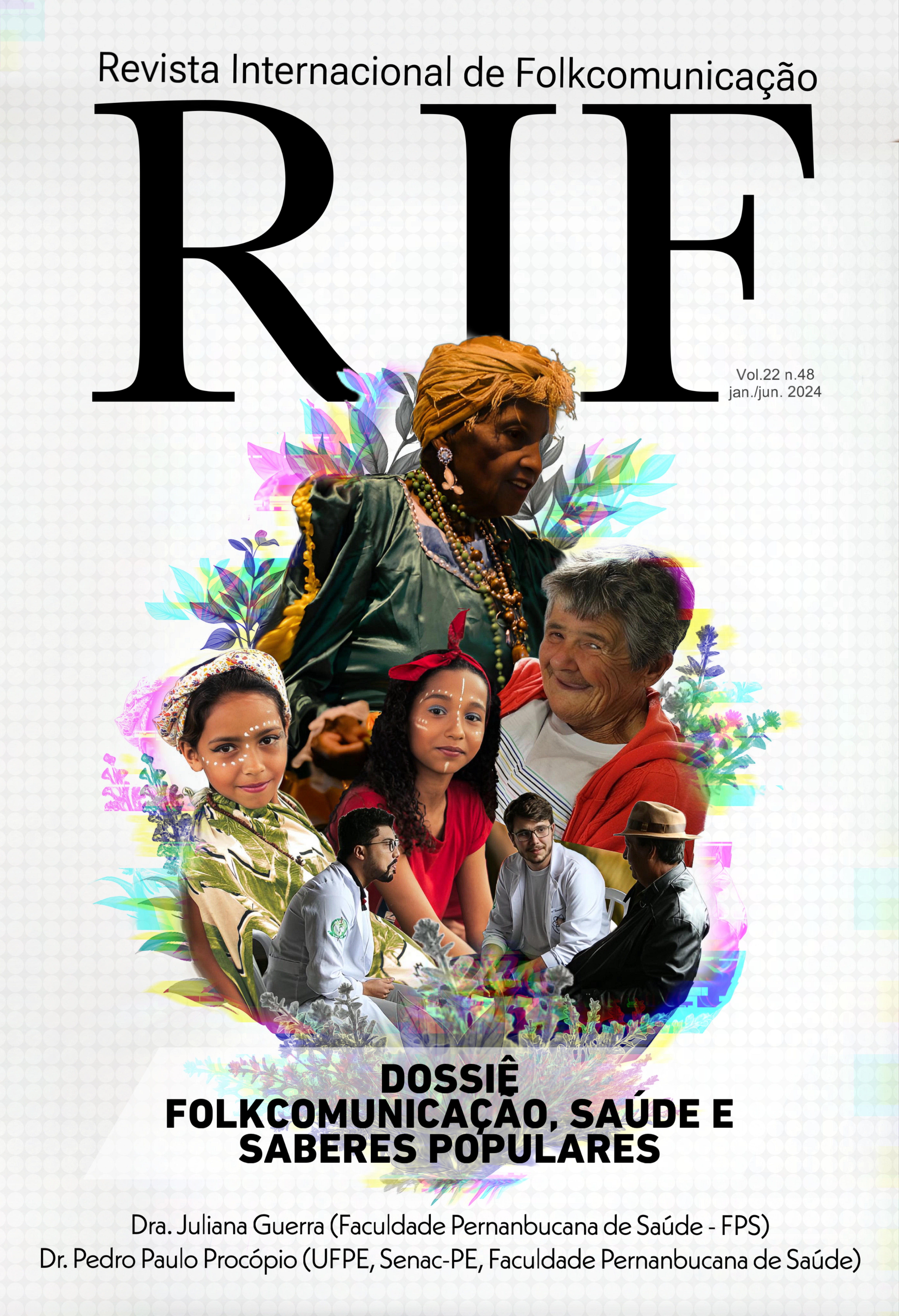O ex-voto e o papel da folkcomunicação no processo de diálogos interculturais em cuidados de saúde
DOI:
https://doi.org/10.5212/RIF.v.22.i48.0005Keywords:
Folkcomunicação, Ex-votos, Saberes populares, Biomedicina, Saúde comunit´áriaAbstract
This article examines how ex-votive narratives intertwined with biomedicine reflect popular health practices through folk communication. We analyzed ex-votos in the Sala de Milagres at the Basílica do Senhor do Bomfim and testimonials of graces from the Irmã Dulce Memorial, noting how faith blends with limited access to conventional medical treatments. Employing qualitative methods, such as document analysis and content analysis, the study highlights how ex-votos manifest individual and collective relationships with biomedicine. These objects and popular narratives serve as communicative mediums that incorporate ordinary knowledge and resist dominant epistemologies, thus valuing traditional knowledge and spiritual practices. The study underscores the role of spiritual practices in strengthening social bonds and cultural identities, contributing to the well-being of marginalized communities.
Downloads
References
BARDIN, Laurence. Análise de conteúdo. São Paulo: Edições 70, 2011, 229 p.
BELTRÃO, Luiz. Folkcomunicação: A comunicação dos marginalizados. São Paulo: Editora Cortez, 1980.
BELTRÃO, Luiz. Folkcomunicação: Um estudo dos agentes e dos meios populares de informação, de fatos e de expressão de ideias. Porto Alegre: EDIPUCRS, 2001.
BELTRÃO, Luiz. Folkcomunicação: Teoria e Metodologia. São Bernardo do Campo: Metodista, 2004.
CAMARGO JUNIOR, Kenneth Rochel. A Biomedicina. PHYSIS: Rev. Saúde Coletiva, Rio de Janeiro, 15(Suplemento):177-201, 2005.
CRESWELL, J. W. Projeto de pesquisa: métodos qualitativo, quantitativo e misto. Porto Alegre, RS: Artmed, 2007.
CURY, Marília Xavier. Museologia e Conhecimentos, Conhecimento Museológico - uma perspectiva dentre muitas. Revista Museologia & Interdisciplinaridade, Vol. 3, nº 5, maio/junho de 2014, pp. 55-73.
HOWARD, George S. Culture tales: A narrative approach tothinking, cross-cultural psychology, andpsychotherapy. American psychologist, v. 46, n. 3, p. 187-197, 1991.
LANDER, Edgardo et al. (Ed.). A colonialidade do saber: eurocentrismo e ciências sociais: perspectivas latino-americanas. CLACSO, Consejo Latinoamericano de Ciencias Sociales= Conselho Latino-americano de Ciências Sociais, 2005.
MELO, José Marques de. Folkcomunicação, contribuição brasileira à Teoria da Comunicação. Revista Internacional de Folkcomunicação, v. 1, n. 1, 2003.
MINAYO, M. C. S. O desafio da pesquisa social. In: MINAYO, M. C. S. (Org.). Pesquisa social: teoria, método e criatividade. Rio de Janeiro, RJ: Vozes, 2009. p. 9-29.
MIRANDA, S. M.; OLIVEIRA, J. C. A.; SILVA NETO, N. R. S. Dos Bits aos Átomos: os ex-votos como folkmedia. In: Conferência Brasileira de Folkcomunicação, nº 20, 2021. Disponível em: http://www.redefolkcom.org/ja-esta-disponivel-o-e-book-dos-anais-da-folkcom-2021/. Acesso em: 12 ago. 2022.
OLIVEIRA, Franciane da Silva Santos; BARBOSA, Lia Pinheiro. Epistemologias marginalizadas: a questão racial no debate sociológico latino-americano. Afro-Ásia, n. 62, p. 338-390, 2020.
OLIVEIRA, José Cláudio Alves. Ex-votos da Sala de Milagres do Santuário de Bom Jesus da Lapa: sociedade, religião e arte. 2. ed. Ponta Grossa: Atena, 2022. 84 p.
PIEDADE, Maria Requião. Introdução a teoria da classificação. Rio de Janeiro: Interciência, 1977. p. 9-145.
REIS, Diego dos Santos. A colonialidade do saber: perspectivas decoloniais para repensar a univers (al) idade. Educação & Sociedade, v. 43, p. e240967, 2022.
SIMÕES, Gabriel Lima. A riqueza dos saberes populares: pela valorização das epistemologias não eurocentristas. In: Congresso Internacional de Política Social e Serviço Social: desafios contemporâneos; Seminário Nacional de Território e Gestão de Políticas Sociais; Congresso de Direito à Cidade e Justiça Ambiental. 2019. p. e3008-e3008.
TEIXEIRA, Leônia Cavalcante et al. O Corpo em Estado de Graça: ex-votos, testemunho e subjetividade. Revista Psicologia & Sociedade, n. 22 (1): 121-129, 2010. Disponível em: https://www.scielo.br/j/psoc/a/F6sWnykz4sMdpW4hxc6hZGc/?format=pdf&lang=pt. Acesso em: 08 jun. 2024.
Downloads
Published
How to Cite
Issue
Section
License

Este obra está licenciado com uma Licença Creative Commons Atribuição 4.0 Internacional.
Os autores são responsáveis, em qualquer que seja o formato do texto, pelas opiniões expressas ou indiretas presentes em seus respectivos trabalhos, não endossáveis pelo Conselho Editorial e pelos editores da Revista, bem como pela autenticidade do trabalho. Ao publicar trabalhos na Revista Internacional de Folkcomunicação, os autores cedem automaticamente os direitos autorais à publicação para veiculação das produções acadêmicas, sem ônus para a Revista. Os autores detêm os direitos autorais do texto para o caso de publicações posteriores e concedem à Revista Internacional de Folkcomunicação o direito de primeira publicação, com o trabalho simultaneamente licenciado sob a Creative Commons Attribution License, que permite o compartilhamento do trabalho com reconhecimento da autoria e publicação inicial nesta Revista. Por serem publicados em revista de acesso livre, os artigos são de uso gratuito, com atribuições próprias, em atividades educacionais e não-comerciais, sendo permitida a publicação simultânea em repositórios institucionais.































